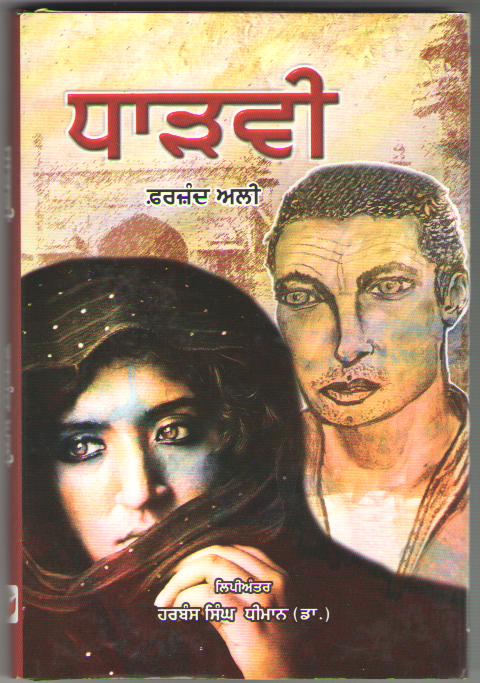Farzand Ali opens a wide window on Pakistan
Jaspal Singh
About 130 million people speak Punjabi, the 10th most spoken language in the world. Nearly 100 million of them live in West Punjab (Pakistan) while around 27 million on the Indian side and rest in other parts of the world. Punjabi does not have a single script like other languages. In Pakistan, Punjabi is written in the Shahmukhi (Perso-Arabic) script and in Indian Punjab in the Gurmukhi script.
Hundreds of books are published in Punjabi in both parts of Punjab but because of the script barrier, these are not universally exchanged and read. Sometimes a book published in Pakistani Punjabi is transliterated (apart from the online form) in Gurumukhi, which then is widely read by people. One such book is Dharvi (Predators) by a Pakistani writer Farzand Ali, transliterated by Harbans Singh Dhiman and published in India by Sangam Publications, Patiala.
This is a story revolving around two families in a village near Lahore. One family is that of a poor shepherd, Fakeeria and the other is of the village landlord Wajid. As a part of the landed aristocracy, Wajid manages to become a member of the Pakistan National Assembly. Between these two families, the entire social structure of Pakistani society and the character of the classes like landed aristocracy, emerging capitalist class and the clergy with all their flaws, trickery and barbarities are laid bare.
The plight of the poor landless labourers who now are forced to work in factories at paltry wages and their living conditions in the basti (slum) are presented in vivid details. The uprooted agricultural workers are allotted small plots in the basti where they live in deplorable conditions. Extreme poverty pushes many youngsters into the criminal world of drugs, gambling, prostitution, robberies and even murders.
Fakeeria has three sons and a daughter. Two elder sons are school dropouts and they ply donkey carts in and around the basti. But the youngest one, Habib, is made of different mettle. After completing his high school, he manages to join a college in the city with the help of his sister Bushra. She manages to get the job of a women workers’ supervisor in a pharmaceutical factory nearby after completing her high school in the village. Bushra is very charming, which is why the factory manager promotes her, keeping an evil eye on the poor girl. One day, the factory owner visits the factory. While going around the packing section, where Bushra is posted, he takes a fancy to her. She is immediately transferred to the head office in the city, to be trained as his personal secretary.
In course of time, the master arranges her marriage to one of his trusted aides, Riyaz, and allots them a decent residence in the city itself. Of course, for this generosity she has to be intimate with him. With money, she is able to help her younger brother Habib get university education. Master’s wife herself is enamoured with Bushra’s young husband.
Landlord Wajid’s sister Kaniza who has had university education too is a different lot like Habib. She has been a student of world history and philosophy. She hates the ruling classes of Pakistan and holds them responsible for the miseries of the millions of poor Pakistanis. She has a liking for Habib, who too as a serious student tries to understand the basic contradictions in Pakistani society. He realises that on one hand, landed aristocracy is preying on the people and on the other are the predacious capitalists.
The third predator is the clergy. Every village has one or more mosques, where maulvis keep on propagating virulently bigoted variety of Islam. In the wake of Soviet invasion of Afghanistan, thousands of madrassas (Islamic seminaries) spring up. The mullahs control these, and prepare the boys for jehad in Afghanistan as Taliban cadre. Weapons and finances are initially provided by America.
In course of time, mullahs start extorting money from the landlords, businessmen and even the common people as the custodians of religion, besides receiving hefty remittances from abroad. Mullahs develop the lifestyle of glitzy babas of India, so do the terrorist leaders. The ordinary people blinded by Islamic bigotry supply the cannon fodder. So the landed aristocracy, industrialists, clergy and the terrorist outfits all are predators of the common people. The unity and the seeming order in the country are maintained by the ubiquitous army and its intelligence wings.
Wajid’s sister Kaniza, when she cannot hit hard somewhere to break the vicious circuit, commits suicide by jumping from the roof of their haveli (mansion). Farzand Ali, the author, emphasises on the fact that the present turmoil in Pakistan cannot last long. The system that breeds extreme deprivation at such a massive scale for the wanton luxuries of a few must explode sooner or later.
Farzand Ali seems to have correctly diagnosed the disease. But no practical solution is suggested, which perhaps is too drastic to be spelled out. Is India totally free from such ills? How can it ward off the rogue elements invading and usurping the democratic space in society remains to be answered.










